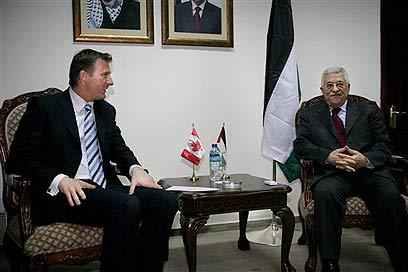
Talks on core issues to be launched Monday
Heads of Israeli, Palestinian negotiation teams to meet for first discussion on Jerusalem, settlements, Palestinian refugees, borders, security and water sources. Abbas: If we reach an understanding on these issues, it would be safe to say there is an agreement
Foreign Minister Tzipi Livni, head of the Israeli negotiations team, and former Palestinian Prime Minister Ahmed Qureia, head of the Palestinian negotiation team, will meet Monday for a first discussion on the core issues, which include Jerusalem, the settlements, the Palestinian refugees, the borders, security and the water resources.
Palestinian President Mahmoud Abbas announced Sunday that the talks on the core issues with Israel would begin Monday.
Speaking before the PLO General Assembly in Ramallah, the Palestinian leader said that "the negotiations would be held on three channels – the permanent agreement issues, the implementation of the Road Map's first clause, and the economic and security issues.
According to Abbas, this time the three channels will take place simultaneously.
He promised that the Palestinians would reject any proposal for an arrangement which would not include a permanent agreement.
"We will not agree to any solution which will not include the issues of Jerusalem, the refugees, the borders and the water. If we reach an agreement on these issues, it will be safe to say that there is an agreement."

Abbas (R) with Canadian foreign minister (Photo: AP)
According to the Palestinian president, the sides have implemented what was agreed upon at the Annapolis peace conference.
He once against called on the Hamas movement to annul its takeover of the Gaza Strip in order to launch a renewed intra-Palestinian dialogue. He also called for early elections.
"Although Hamas has tried to assassinate me in the past, I am ready for a renewed dialogue with them and for talks on early elections," Abbas said.
Canada pledges $200 million to aid Palestinians
The Palestinian president met earlier with Canadian Foreign Minister Maxime Bernier, who pledged $200 million in new aid to the Palestinian economy as part of decisions made by the international community in a Paris conference last month.
Bernier said the money, to be allocated over the coming five years, will be used for security and government reform. He said the pledge coincides with a pledge by Israeli and Palestinian leaders to aim for a peace treaty this year, made at the US-sponsored Mideast conference in November.
On Monday, the Canadian minister is expected to meet with senior Israeli officials and visit the Yad Vashem Holocaust museum.
In a meeting held last week between Abbas and Prime Minister Ehud Olmert before US President George W. Bush's visit to Israel, the two leaders agreed on the outline for the negotiations on the core issues.
The talks are expected to be held according to a "three-level" model. First, Livni and Qureia will discuss the core issues in a direct dialogue. The negotiation teams will then discuss the issues in detail. In case of a disagreement, Abbas and Olmert will intervene.
Minister for Strategic Affairs Avigdor Lieberman, chairman of the Yisrael Beiteinu party, recently threatened to resign from the government if negotiations are launched on the core issues.
Olmert and Lieberman are expected to meet on Tuesday in order to discuss the clarifications the minister demanded in terms of the core issues negotiations and the evacuation of illegal outposts.
Lieberman's associates said that should Olmert decide to evacuate outposts or hold real negotiations on the core issues, the Yisrael Beiteinu faction would leave the government. Aides to the prime minister estimated that Lieberman would not resign this week after receiving Olmert's clarifications.
Olmert is expected to tell Lieberman that the talks on the core issues are only beginning and that the sides would probably encounter difficulties and fail to reach an understanding. Sources in the Likud, however, estimated that Lieberman's resignation was only a matter of time.
Ronny Sofer, Attila Somfalvi and AP contributed to this report










